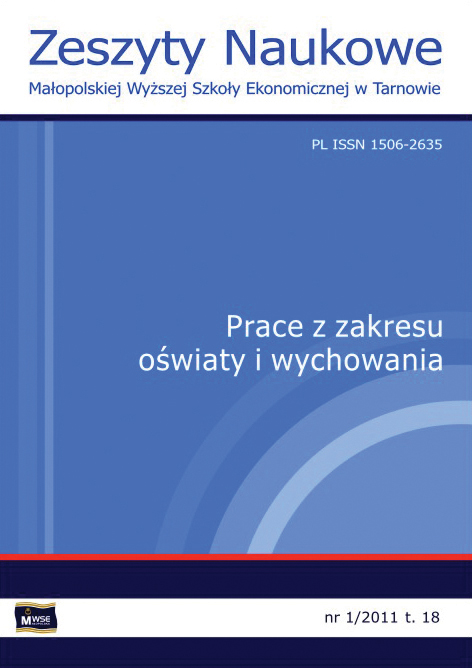Abstract
The concept of interest is present throughout a persons entire life, therefore in conjunction with dynamic transformations of the modern world, including education, the reinterpretation of the essence, especially types and factors of development of interests seems necessary. Inadequate to the present day seem to be answers to the questions of what are interests, what is the order of their occurrence, who and/or what determines their occurrence and what is the role of schools and teachers in the process of their formation. The article attempts to outline the theoretical foundations of these issues in a specific systemic insight, in accordance with the idea that a whole is more than a simple sum of its parts, which means vertically and horizontally coherent system of components of the essence of interest, and methodology of their formation. And so the overall definition of interest can be replaced today with over additive one, according to which the interests are created not only combined, but also in relations incorporated of three components - cognitive, emotional and active. Similarly, the methodology of interest development is not a simple consonance of their components, it is created of vertical and horizontal system of objectives and contents, rules and forms as well as methods and means of education and teaching. The source of shaping the interest is not only the teaching program and its high or author's recommendations, but also opportunities, activities and needs of students, parents, teachers as well as socio-cultural resources of the school environment. Furthermore, the development of interests shall take place during various forms of school activities as well as extracurricular activities. In addition, the planning and realisation of the assumptions of system totality requires from the teacher the scrupulousness and perseverance, attention to mutual relations between the components of the process of formation of interest. In conclusion, we can say that the development of student's interest through the use of assumptions of system totality is a challenge of modern education and it is not an easy task - laborious, requiring a thorough effort and attention, but worthy of completion due to higher (deeper and wider) results of cognition.
References
Albińska P. 2007. Rodzina jako środowisko kształtujące zainteresowania. "Kwartalnik Edukacyjny", nr 4, s. 28–37.
View in Google Scholar
Dąbrowa M. 1975. Szkolne wycieczki historyczne. Warszawa: WSiP.
View in Google Scholar
Duraj-Nowakowa K. 1992. Teoria systemów a pedagogika. Kraków: Wyd. Naukowe WSP. ISSN 0239-6025.
View in Google Scholar
Duraj-Nowakowa K. 2005. Źródła podejść do pedagogiki. Kielce: Wyd. ŚSW. ISBN 838986407X.
View in Google Scholar
Gaś Z.B. 2001. Doskonalący się nauczyciel: psychologiczne aspekty rozwoju profesjonalnego nauczycieli. Lublin: Wyd. UMCS. ISBN 8322717741.
View in Google Scholar
Grad J. 1997. Badania uczestnictwa w kulturze artystycznej w polskiej socjologii kultury: analiza metodologiczno-teoretyczna. Poznań: Wyd. Naukowe UAM. ISBN 8323208166.
View in Google Scholar
Gurycka A. 1989. Rozwój i kształtowanie zainteresowań. Warszawa: WSiP. ISBN 8302037346.
View in Google Scholar
Janowski A. 1985. Poznawanie uczniów. Warszawa: WSiP. ISBN 8302028509.
View in Google Scholar
Kaliszewska M., Klasińska B. (red.). 2010. Szkice systemowych ujęć pedagogiki. Kielce: Wyd. UJK. ISBN 978-83-7133-448-1.
View in Google Scholar
Kwiatkowski S.M. (red.). 2008. Edukacja ustawiczna: wymiar teoretyczny i praktyczny. Warszawa–Radom: IBE, ITE. ISBN 9788387925970.
View in Google Scholar
Ostasz L. 2001. Potencjał ludzki a wychowanie: z antropologicznych podstaw pedagogiki. Olsztyn: Wyd. UWM. ISBN 8372990832.
View in Google Scholar
Przetacznik-Gierowska M., Makiełło-Jarża G. 1985. Psychologia rozwojowa i wychowawcza wieku dziecięcego. Warszawa: WSiP. ISBN 8302022705.
View in Google Scholar
Reber S. 2000. Słownik psychologii. Warszawa: Wyd. Naukowe Scholar. ISBN 8387367648.
View in Google Scholar
Sillamy N. 1994. Słownik psychologii. Katowice: Wyd. Książnica. ISBN 8385348670.
View in Google Scholar
Skorny Z. 1987. Psychologia wychowawcza dla nauczycieli. Warszawa: WSiP. ISBN 830203332.
View in Google Scholar
Słoniewska H. 1959. Psychologiczna analiza zainteresowania. Poznań: Wyd. PTPN.
View in Google Scholar
Strelau J., Jurkowski A., Putkiewicz Z. 1974. Podstawy psychologii dla nauczycieli. Warszawa: PWN.
View in Google Scholar
Super D. 1972. Psychologia zainteresowań. Warszawa: PWN.
View in Google Scholar
Szewczuk W. (red.). 1975. Psychologia: zarys podręcznikowy. Warszawa: WSiP.
View in Google Scholar
Szewczuk W. (red.). 1998. Encyklopedia psychologii. Warszawa: Wyd. Fundacji "Innowacja". ISBN 8386169192.
View in Google Scholar
Tomaszewski T. (red.). 1972. Psychologia. Warszawa: PWN.
View in Google Scholar
Wesołowska E.A. 1988. Wychowanie patriotyczne w szkole. Warszawa: WSiP. ISBN 8302038709.
View in Google Scholar
Żebrowska M. (red.). 1977. Psychologia rozwojowa dzieci i młodzieży. Warszawa: PWN.
View in Google Scholar
© Copyright by Małopolska School of Economics in Tarnów. The articles are available under the Creative Commons Attribution NonCommercial-NoDerivatives 4.0 International License


